Introduction: In this article, Melissa Davenport Berry concludes her series about Bartholomew Gosnold, who was instrumental in founding the Jamestown Colony in Virginia in 1607. Melissa is a genealogist who has a website, americana-archives.com, and a Facebook group, New England Family Genealogy and History.
Today I conclude my story on the sea adventures of explorer Captain Bartholomew Gosnold (1571-1607), who was the commander of Godspeed – one of the three ships sponsored by the Virginia Company of London to form a colony in Virginia.
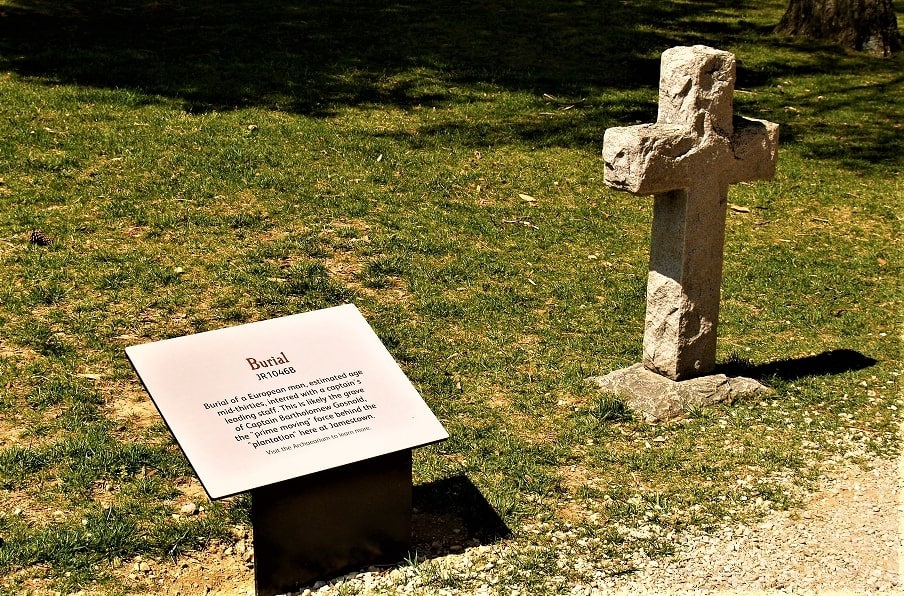
Along with the other two ships, Susan Constant and Discovery, the settlers reached the Virginia coast in late April and after a few weeks decided on a settlement location, Jamestown, on 13 May 1607.
To recap my last story: Gosnold’s descendant Lord Timothy Tollemache, 5th Baron Tollemache, along with a large committee on both sides of the Atlantic, helped to finance a replica of the Godspeed to sail its original course from England to Virginia, in 1985. It would coincide with the celebration of the 350th anniversary of the founding of Hampton, Virginia.
According to the Richmond Times-Dispatch, when the replica of Godspeed was ready to set sail for Virginia it was given a royal send off by Prince Philip, the Duke of Edinburgh.
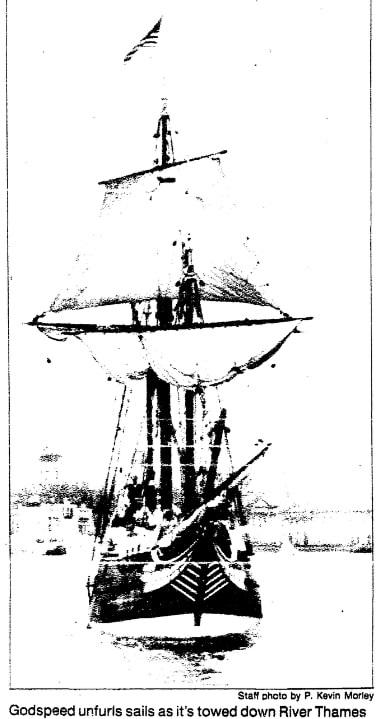
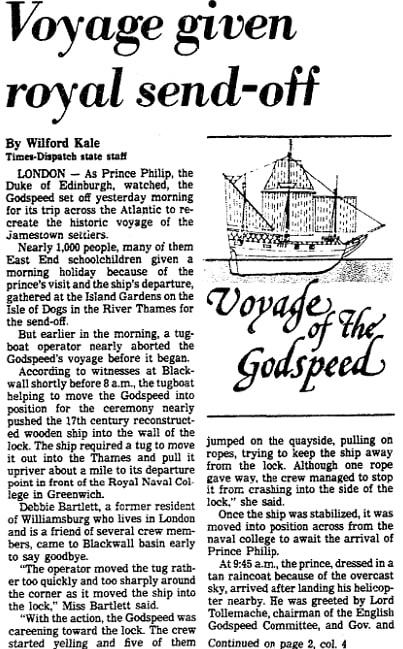
According to this article, Prince Philip chatted with the Jamestown descendant families from Virginia who were involved in the project and had traveled to England for the Godspeed’s send-off. They included Debbie Bartlett, Sen. Hunter Booker Andrews, Sen. Charles Spittal Robb, Albert Lee Philpott, Ross Leonard Weeks, Ernest M. Carter, Luther Ray Ashwork, Stuart Wallace Connock, and Wayne A. West.
Prince Philip was fascinated by the whole venture and lingered much longer than anticipated. He asked many technical questions while on board the ship.
The flag seal of the commonwealth and its motto inscription, “Sic semper tyrannis,” or “thus always to tyrants,” caught his attention. Senator Rob explained its symbolism and meaning, as it represented the foundation of Virginia.
Before Prince Philip departed, he asked Godspeed’s Capt. George Salley to send him a telegram upon the ship’s arrival at Jamestown. Sen. Robb sent the prince off with a set of goblets like the ones that were designed for Thomas Jefferson (also a Jamestown descendant) while he was in France in the 1790s.
Lord Tollemache was in attendance along with another tiny descendant: Daniel Gosnold, age 4.
Tollemache would travel to Virginia to see the Godspeed docked at Jamestown Park on October 29. Here is a photo of him in the Richmond Times-Dispatch.
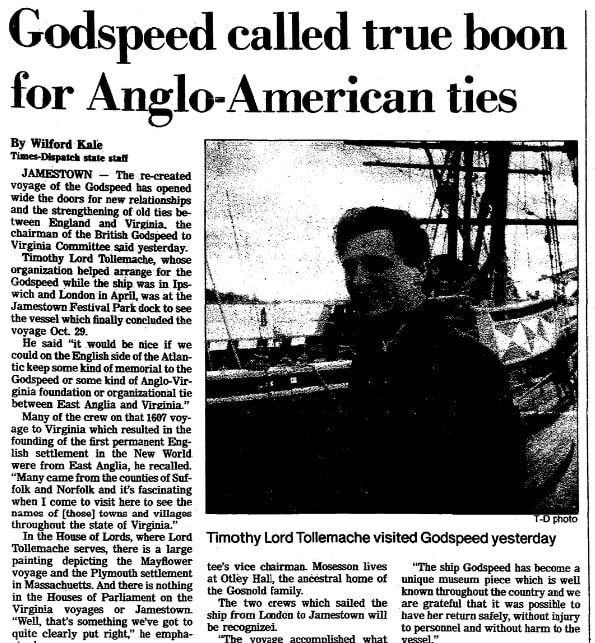
Lord Tollemache believed that the voyage of the Godspeed emphasized the importance of marking this period in history and strengthened old ties between England and Virginia. He noted the Jamestown settlement is often eclipsed by the Plymouth Colony, settled by Pilgrims who arrived on the Mayflower in 1620.
On Thanksgiving Day, he was a featured speaker for the celebration of the safe arrival of the Godspeed. Another presenter was John Mosesson of Otley Hall, the seat of Captain Gosnold and his family in England.
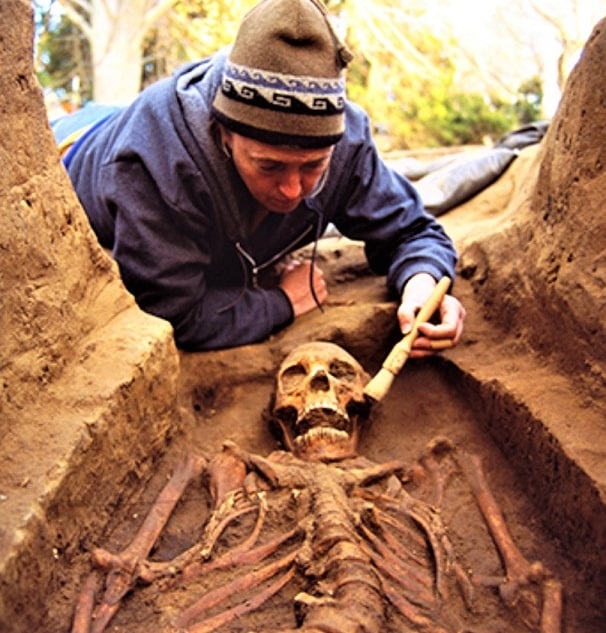
In 2002-2003 an amazing discovery was made during an archaeological dig at the Jamestown Fort that placed Capt. Gosnold in the spotlight again.
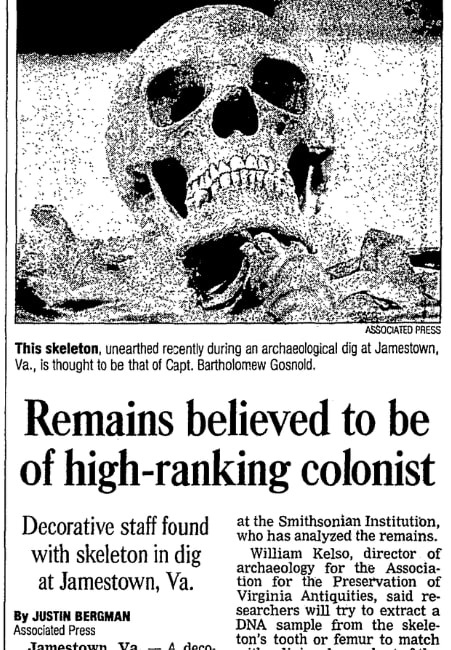
An unearthed skeleton was believed to be that of Capt. Bartholomew Gosnold, second in command of the founding of Jamestown. It was noted as one of the most significant finds of early colonial history. Also found in the grave was a decorative staff indicating a high-ranking colonist.
This article reported:
“This is absolutely the best-preserved skeleton we’ve found from this time period, and I’m totally surprised by the quality of it,” said Douglas Owsley, a forensic osteologist at the Smithsonian Institution, who has analyzed the remains.
William Kelso, director of archaeology for the Association for the Preservation of Virginia Antiquities, said researchers will try to extract a DNA sample from the skeleton’s tooth or femur to match with a living descendant of the Gosnold family.
In 1606, Gosnold commanded the Godspeed, one of three ships that landed 107 settlers at Jamestown in May 1607. He helped design the triangular fort where they lived.
Capt. John Smith, credited with leading and ultimately saving the colony, described Gosnold as “the prime mover behind the settlement.”
Gosnold also discovered and named Cape Cod and Martha’s Vineyard.
Kelso said the remains will eventually be reburied at Jamestown. Officials would like to include many of the artifacts in the 400th anniversary celebration of the founding of the colony in 2007.
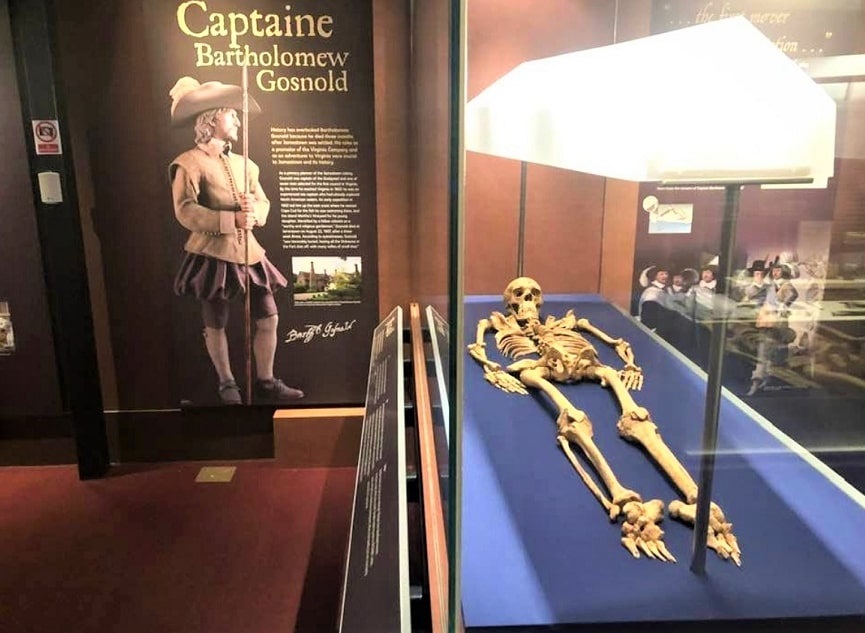
Note: Kelso also stated, in another article, that Gosnold died quite early on, but oversaw the building of a fort in just 19 days. He was 37 years old and suffered an illness from fever.
It was recorded that when he was buried, all the guns in the fort were fired off in his honor.
In a later story I will include more on the Gosnold and other archaeological digs. I did find photographs on the Gosnold exhibit from the Jamestown Rediscovery website: the “Archaearium” exhibits, focusing on the 1607-1624 Virginia Company period at Jamestown.
You can view slide shows of the 1985 voyage and crew members at Godspeed.
Explore over 330 years of newspapers and historical records in GenealogyBank. Discover your family story! Start a 7-Day Free Trial.
Note on the header image: the Godspeed replica, 19 April 1985, in London at St. Katherine’s Docks. Courtesy of the Jamestown-Yorktown Foundation.
Related Articles:
